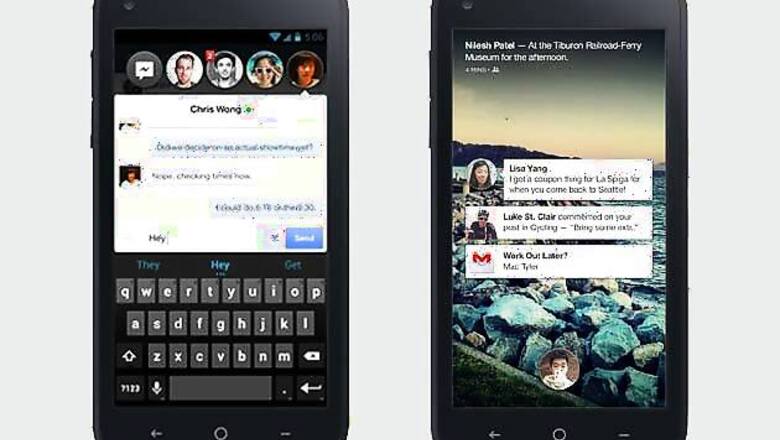
views
New Delhi: Are you wondering what is this new term 'Facebook Home'? Here, we simplify it for you. Facebook Home is a new app for Android. It is a new way to turn your Android phone into a social phone. Facebook on Thursday unveiled "Facebook Home" software to place the world's social network front and centre on Android users' smartphones.
Home isn't a phone or operating system, and it's also more than just an app, says Facebook. Home is a completely new experience that lets you see the world through people, not apps. Its new family of apps will let users display mobile versions of their newsfeed and messages prominently on the home screens of a wide range of devices based on Google's Android operating system, CEO Mark Zuckerberg told reporters.
"Why do we need to go into those apps in the first place to see what's going on with those we care about?" Zuckerberg told the hundreds of reporters and industry executives gathered at Facebook's Menlo Park campus. "We want to bring all this content to the front," he said. It is a move that may divert users from Google services and steal some of its rival's momentum in the fast-growing mobile arena.
Facebook Home is built around your friends and puts them at the centre of your phone. Here are some interesting feature of the Facebook Home app for Android:
- Cover feed: A constant, fresh stream of photos and updates from your newsfeed, cover feed is always present when you wake up your phone. It lets you stay up-to-date on your friends' latest activities in real-time, all the time. You can swipe through to see more photos and updates, double tap to 'like' a post and comment right from cover feed. Cover feed is for those in-between moments like waiting in line at the grocery store or between classes when you want to see what's going on in your world.
- Notifications: Cover feed is great for seeing everything going on in the world. But when something happens that's more important and directed at you, like a friend posting on your timeline, you'll receive notifications with their profile pictures. To open notifications, just tap them. And if you don't want to deal with them right now, you can just swipe to hide them and keep flipping through cover feed until you want them back.
- Chat Heads: With chat heads you can keep chatting with friends even when you're using other apps. When friends send you messages, a chat head appears with your friend's face, so you see exactly who you're chatting with. Messages reach you no matter what you're doing - whether you're checking email, browsing the web, or listening to music. You can move chat heads around and respond to messages. And since SMS is integrated into Facebook Messenger for Android, chat heads include Facebook messages as well as texts.
- App Launcher: It's as easy to get to your apps in Home as it is on any other phone. Swipe up to see your favorite apps in the launcher. There's also a screen containing all of your apps, and you can drag your favorite apps to the launcher.
- Instagram: HTC First is the only phone that comes with Instagram pre-loaded.
How to get Facebook Home
Facebook Home will be available as a free download from the Google Play Store starting April 12. Home works on the HTC One X, HTC One X+, Samsung Galaxy S III and Samsung Galaxy Note II. Home will also work on the forthcoming HTC One and Samsung Galaxy S4, and on more devices in the coming months.
Home will also be available pre-installed on phones through the Facebook Home Program. HTC has launched its first phone with Facebook Home name "HTC First". It goes on sale April 12.
Facebook and mobile presence
"Home" brings the competition between the two Web superpowers to the mobile front, which is becoming many consumers' primary conduit to the Internet. Facebook, the world's largest social network, and Google, the dominant Internet search engine, are locked in battle for Internet users' time online and for advertising dollars.
For Facebook, bolstering its mobile presence is critical. Nearly 70 per cent of Facebook members used mobile devices such as smartphones and tablets to access its service at the end of 2012, and 157 million of Facebook's roughly 1 billion users accessed the service solely on a mobile device.
The company has stepped up efforts to ensure that its revenue-generating ads can be viewed on mobile devices and Zuckerberg has said that the company's engineers are now focused on creating "mobile-first experiences."
Reports that Facebook was developing its own smartphone have sporadically appeared for years though Zuckerberg has shot them one down, saying that building a Facebook phone would be "the wrong strategy."
With specialised software that adds a layer on top of Android, Facebook may get many of the benefits of having its own phone without the costs and risks of actually building a hardware device.

















Comments
0 comment